
id Software LLC is an American video game developer based in Richardson, Texas. It was founded on February 1, 1991, by four members of the computer company Softdisk: programmers John Carmack and John Romero, game designer Tom Hall, and artist Adrian Carmack.

Simple DirectMedia Layer (SDL) is a cross-platform software development library designed to provide a hardware abstraction layer for computer multimedia hardware components. Software developers can use it to write high-performance computer games and other multimedia applications that can run on many operating systems such as Android, iOS, Linux, macOS, and Windows.

The Marathon Trilogy is a science fiction first-person shooter video game series from Bungie, originally released for the Classic Mac OS. The name of the series is derived from the giant interstellar colony ship that provides the main setting for the first game; the ship is constructed out of the Martian moon Deimos. The series is often regarded as a spiritual predecessor of Bungie's Halo series.

UAE is a computer emulator which emulates the hardware of Commodore International's Amiga range of computers. Released under the GNU General Public License, UAE is free software.

Hyperion Entertainment CVBA is a Belgian software company which in its early years focused in porting Windows games to Amiga OS, Linux, and Mac OS. In 2001, they accepted a contract by Amiga Incorporated to develop AmigaOS 4 and mainly discontinued their porting business to pursue this development. AmigaOS 4 runs on the AmigaOne systems, Commodore Amiga systems with a Phase5 PowerUP accelerator board, Pegasos II systems and Sam440/Sam460 systems.
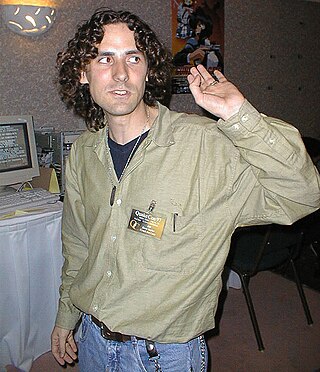
Dave D. Taylor is an American game programmer, best known as a former id Software employee and noted for his work promoting Linux gaming.
VisualBoyAdvance is a free emulator of the Game Boy, Game Boy Color, and Game Boy Advance handheld game consoles as well as of Super Game Boy and Super Game Boy 2.

Mercenary is a 3D action-adventure game written for the Atari 8-bit family and published by Novagen Software in 1985. It was converted to the Commodore 64, ZX Spectrum, Amstrad CPC, Atari ST, Amiga and Commodore 16/116/Plus/4 platforms. The game uses vector graphics renderings of vast, sparse environments and has open-ended gameplay. It was also released as Mercenary: Escape from Targ and Mercenary: A Flight Simulator Adventure.

Maelstrom is a multidirectional shooter developed by Andrew Welch and released as shareware in November 1992 for Mac OS. The game is an enhanced clone of Atari, Inc.'s 1979 Asteroids arcade video game with a visual style similar to the Atari Games 1987 sequel, Blasteroids. Maelstrom was released when there were few action games for the high-resolution color displays of the Macintosh, and the game attracted attention despite the dated concept. The response led Welch to start Ambrosia Software.
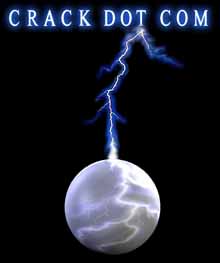
Crack dot Com was a computer game development company co-founded by ex-id Software programmer Dave Taylor, and Jonathan Clark.

FCEUX is an open-source Nintendo Entertainment System and Family Computer Disk System emulator. It is a merger of various forks of FCE Ultra.
Mac gaming refers to the use of video games on Macintosh personal computers. In the 1990s, Apple computers did not attract the same level of video game development as Microsoft Windows computers due to the high popularity of Microsoft Windows and, for 3D gaming, Microsoft's DirectX technology. In recent years, the introduction of Mac OS X and support for Intel processors has eased porting of many games, including 3D games through use of OpenGL and more recently Apple's own Metal API. Virtualization technology and Boot Camp also permit the use of Windows and its games on Macintosh computers. Today, a growing number of popular games run natively on macOS, though as of early 2019, a majority still require the use of Microsoft Windows.
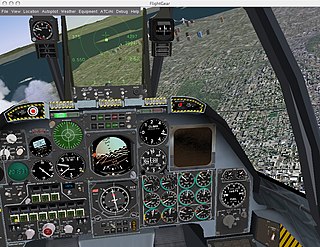
An open-source video game, or simply an open-source game, is a video game whose source code is open-source. They are often freely distributable and sometimes cross-platform compatible.
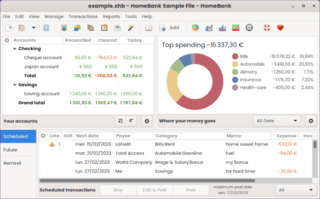
HomeBank is a personal accounting software package that runs on OpenBSD, Linux, FreeBSD, Microsoft Windows, macOS and AmigaOS. Released under version 2 or later of the GNU General Public License, HomeBank is free software. HomeBank can be found in the software repositories of Linux distributions such as Debian, Fedora, Mandriva, openSUSE, Gentoo Linux, Arch Linux and Ubuntu.

Pingus is an open-source video game programmed by German developer Ingo Ruhnke. It is a clone of Lemmings in which the characters are penguins instead of lemmings.
Linux-based operating systems can be used for playing video games. Because many games are not natively supported for the Linux kernel, various software has been made to run Windows games, such as Wine, Cedega, and Proton, and managers such as Lutris and PlayOnLinux. The Linux gaming community has a presence on the internet with users who attempt to run games that are not officially supported on Linux.

C-Dogs, the sequel to Cyberdogs, is a shoot 'em up video game where players work cooperatively during missions, and against each other in "dogfight" deathmatch mode.
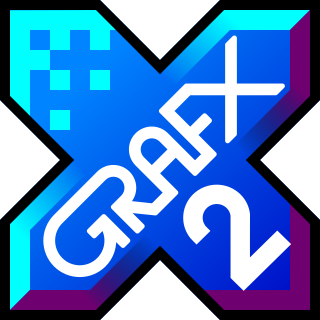
GrafX2 is a bitmap graphics editor inspired by the Amiga programs Deluxe Paint and Brilliance. It is free software and distributed under the GPL-2.0-only license.

Mednafen, formerly known as Nintencer, is an OpenGL and SDL multi-system free software wrapper that bundles various original and third-party emulation cores into a single package, and is driven by command-line input. It is distributed under the terms of the GPL-2.0-or-later license. Certain emulation cores of Mednafen have been ported to RetroArch/Libretro.

PPSSPP is a free and open-source PSP emulator for Windows, macOS, Linux, iOS, Android, Nintendo Wii U, Nintendo Switch, BlackBerry 10, MeeGo, Pandora, Xbox Series X/S and Symbian with a focus on speed and portability. It was released to the public on November 1, 2012, licensed under the GNU GPLv2 or later. The PPSSPP project was created by Henrik Rydgård, one of the co-founders of the Dolphin emulator.

















